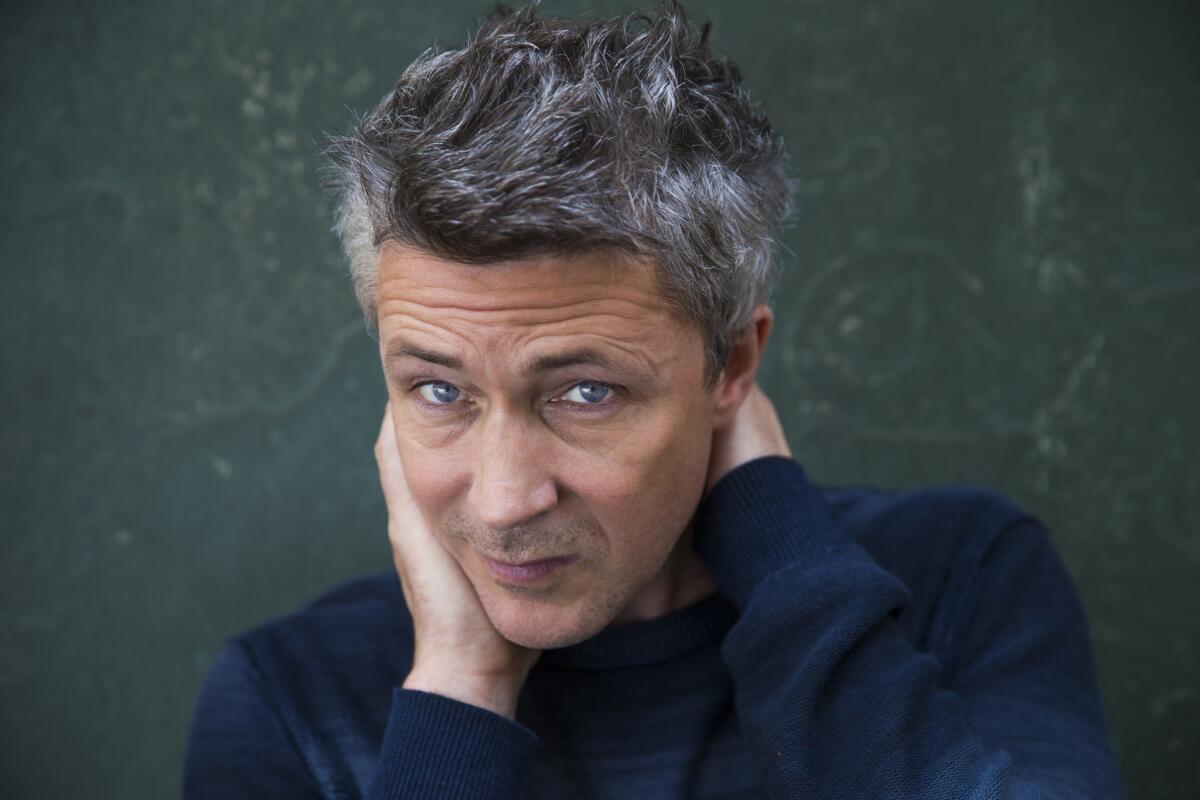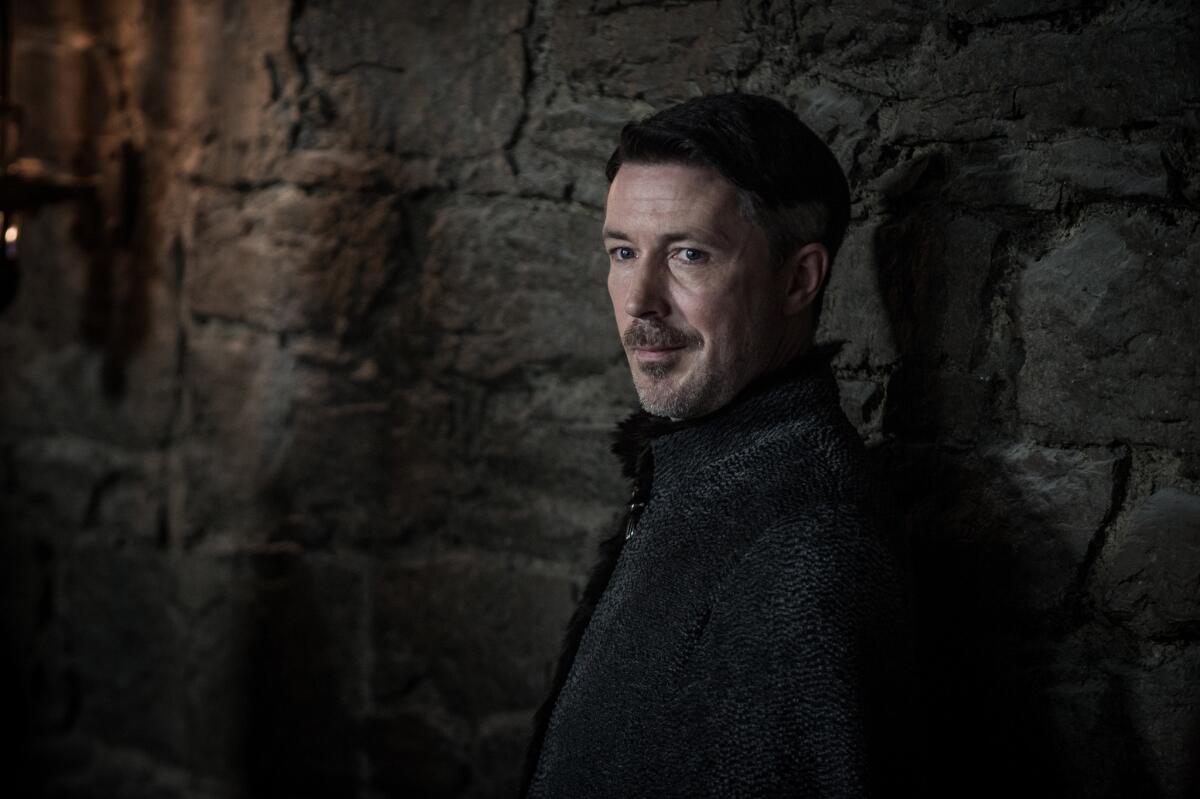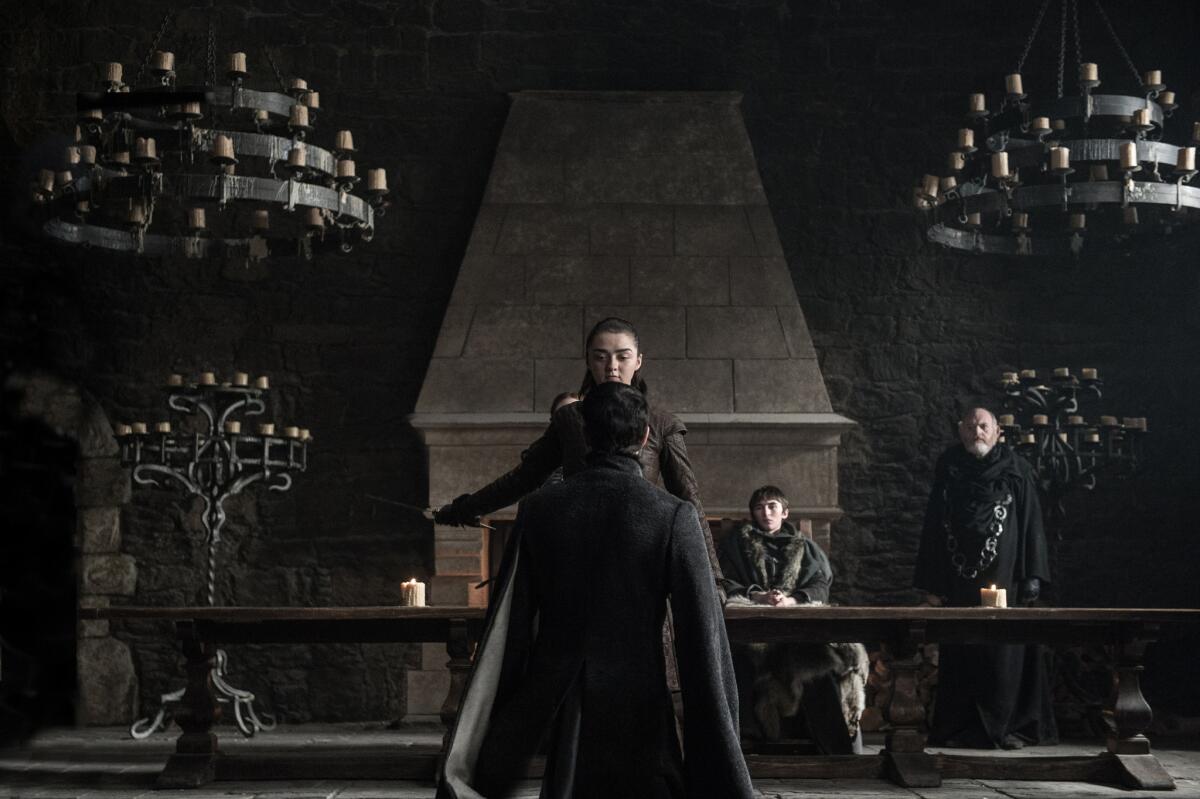Q&A: Aidan Gillen talks about <i>that</i> Littlefinger moment on ‘Game of Thrones’

- Share via
Sunday night the “Game of Thrones” fandom said farewell to a major player. Some fans rejoiced, others grieved. We talked to the man at center of it all:
Warning: Major “Game of Thrones” season finale spoilers ahead.
After seven seasons of deception, Gillen recalled his final moments as Littlefinger via phone from a “crumbly old hotel” on the Southern coast of the U.K. He had not actually seen the season finale; he tried to stream it, but alas the hotel Wi-Fi “ain’t working” fast enough to keep up with the ice dragon carnage.
No matter, “I don’t particularly want to see myself die,” Gillen explained. “I’ve seen it a lot, and I tend to steer clear of those events the last couple of times.”
But if he wasn’t ready to relive the graphic execution, he was happy to chat about his final moments in Winterfell and Westeros. Though much like his character, Gillen knows how to play it close to the vest.

When did you find out that your character was going to die?
It was about a month before we started shooting this season. Just before the scripts were released. It was in the usual way. They give you a call when you don’t usually get a call. The two of them were there [D.B. Weiss and David Benioff]. Same story for everybody else. It was one of the earlier scenes that we shot. Having died earlier on — it sounds so strange to say it that way — it kind of freed you up a bit.
How’d you take it?
I assumed that something was due my way, if not this season then next season. It made no odds to me when it came along, as long as it was some kind of fitting ending. Better to die in Episode 7 than Episode 2.
The showrunners said they were excited to see what you would do with the scenario because this character has imagined every single eventuality except this one. How did you find Littlefinger’s surprise?
That was interesting because this guy is confident enough to never see that happening. Confident enough that his plans couldn’t go that wrong. But also smart enough to realize immediately that the game was up. Which lead to instant, massive humiliation in front of a crowd. That whole thing that he’d been trying to get away from in his whole journey through this. Not just in this season that we saw, but as a young man. That really was an appropriate and fitting ending. And for that death to be ordered by somebody that he’d become so close to …
It seems like it all happened so fast; when you get that script, how do you mentally block that for yourself? How do you prepare for that as an actor?
It does happen fast in terms of an event. But also the screen time is quite short. So you’re trying to cram the thought process in there of your life suddenly going into slow motion and dealing with a time of reckoning in front of a bunch of people. There were a lot of people in that room, a lot of actors, particularly the three Stark siblings. I let myself be intimidated.
Even before we were shot, I made sure to really take it all in, as a performer, and just for my own personal experience. It became the same thing, really. It was quite intimidating. I think it was important that we saw the vulnerability of the human qualities there. And when I say human I just mean that this is something that even for someone as clever Littlefinger, he cannot find his way out. Like a rat in a trap.

That humiliation had to be so enormous and a replication of what had happened to him way back in the beginning of his journey. It was a real fitting end. He's there again, he's done it again, he’s done it to himself.
What's it like playing a character that some fans are actively rooting for them to die?
That's interesting. How much are they rooting for me to die?
Eh… There are some people that want Baelish to get his comeuppance. You killed Ros, you got Ned killed.
Yeah, I know. He deserves some comeuppance. I guess some people thought it wasn't extreme enough, something far nastier should have happened to me. Even though I was trying to not do a classic villain spin on it, the character is a classic villain. And part of that game is that the audience gets to see me die and they enjoy it. So if that's what they’re asking for, we're probably doing it right. I understand it. I don't take it personally.
Do you think Littlefinger was ever going to be satisfied? If he got the Iron Throne do you think he would be happy?
Probably not. It's a funny question because I think he has been satisfied along the way. Satisfied with the way he's carried himself and succeeded as much as he did. I never thought of him as a dissatisfied, unfulfilled person. He’s quite self-satisfied and lethal. He would have kept going, for sure.
But this ending was inevitable, that's the thing. It could have happened 10 years ago, it could have happened 20 years in the future, but he was destined to die in a violent way.
David Benioff called Baelish a sociopath. Do you feel like that’s a fair description?
I think just that word alone isn’t enough. Was that it?
He also said that Baelish truly cared for Sansa in his heart, in whatever way he cared about her. Were those crocodile tears or real tears for him?
I don’t think Baelish does crocodile tears. I don’t think Baelish likes to shed tears, certainly not in front of people. Throughout the seasons, I’ve tried to show something that we haven't seen before in successive seasons … warmth or a bit more of a human side or coldness. But one thing we haven’t seen is real vulnerability or weakness. If we saw some emotion, I don’t really think it was sentimental. I think it was involuntary: Your time is up.
That’s what I felt at the time in the scene. I don’t really want to analyze it or explain it. You want to put one final spin on the character that does disarm people a little and make them rethink everything.
What were your dying words? It was “I …,” then you died out.
I can’t tell you that. Actors have a responsibility to interpret a character and bring something of their own. They have a duty to protect the dignity and the mystery of the character, including not over-discussing details like that, after the fact.
I think over-discussing things, particularly in a show that’s as over-discussed as “Game of Thrones” is diminishing. My job, as this character, will probably go on for a while avoiding questions like that. It’s a good one to ask, but Littlefinger will take secrets to his grave and so will I. Not too soon though, hopefully.
Are you going to miss “Game of Thrones”?
I am. I am. It's liberating also. It feels strange and good. It's been a good ride and a long time, certainly months. I recall quite clearly being up in Belfast just after I'd been cast. I was up there in this film festival looking out a hotel window at the city thinking this place is going to be home for I'm not sure how many years. But I did have a sense I was going on an adventure and I was going to be part of something quite remarkable. I was hoping that it was, and there was a strong sense that it was going to be that.
And it has been.
ALSO:
In 'Game of Thrones' Season 7 finale, women now have a road map to power
Nine burning questions we have after the super-sized 'Game of Thrones' finale
Watch the 'Game of Thrones' cast and crew break down some of Season 7's best scenes
The most believable 'Game of Thrones' fan theories to digest after the finale
The biggest entertainment stories
Get our big stories about Hollywood, film, television, music, arts, culture and more right in your inbox as soon as they publish.
You may occasionally receive promotional content from the Los Angeles Times.








